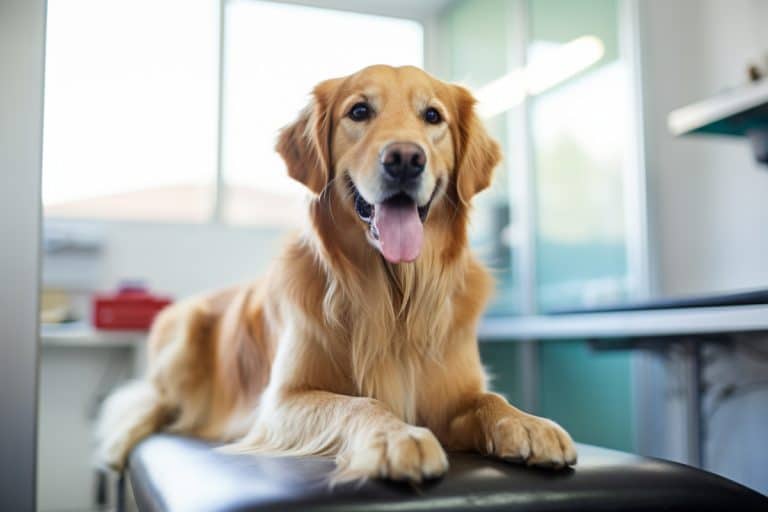Golden Retrievers are known for their friendly, loving nature. They’re the sort of dogs that become part of your family in no time. But owning a Golden Retriever means more than just playtime and cuddles. You have a responsibility to keep them healthy and happy. This article is your go-to source for understanding common and uncommon health issues in Golden Retrievers. From genetic issues to behavioral signs that could mean a trip to the vet, you’ll find what you need to know right here.
General Health Concerns in Golden Retrievers
Of course, not all health issues are genetic. Golden Retrievers can also face general health problems like obesity, skin issues, and allergies. Carrying extra weight can put stress on your dog’s joints and can lead to other issues like diabetes. Golden Retrievers also have sensitive skin that can be prone to allergies and infections.
To keep your dog healthy, make sure they get enough exercise and eat the right foods. You should also check their skin for signs of redness, itching, or infection. If you notice something off, it’s time to go to the vet.
Why Does a Golden Retriever Shake?
If you’ve ever noticed your Golden Retriever shaking, you might have wondered why. Sometimes shaking is normal. It could be that your dog is wet and is trying to dry off. Or maybe they’re just feeling a little anxious. But other times, shaking can be a sign of a health issue. For example, ear infections or joint pain can make your dog shake.
So, how can you tell when shaking is a cause for concern? Pay attention to when and where it happens. If your dog is shaking and scratching their ears a lot, that could mean an ear infection. A quick trip to the vet can get that sorted out. Remember, if you’re ever in doubt, it’s better to be safe and check with your vet.
Why Do Golden Retrievers Lick So Much?
Golden Retrievers are often seen licking themselves, other pets, or even their human friends. While it’s often a sign of affection or simple grooming, excessive licking can indicate a problem. Sometimes, your dog may lick to relieve itchiness caused by allergies or skin infections. Other times, gastrointestinal problems might be the culprit.
When your Golden Retriever starts licking more than usual, consider whether there have been changes to their environment that could trigger allergies. Keep an eye on your pet and consult your vet if the behavior persists. Your vet can run tests to rule out any serious conditions and can help you put together a plan to curb the excessive licking.
Why Does a Golden Retriever Spin?
Dogs spin for all sorts of reasons. Sometimes they’re just happy and excited. Sometimes they’re trying to get your attention. But sometimes, spinning can be a sign of a health issue or a behavioral problem known as a compulsive disorder. This means your dog spins so much that it interferes with their life. It’s a bit like when a person can’t stop washing their hands, even when they’re already clean.
If you notice that your dog spins a lot, especially if they seem distressed when they do it, consult your vet. Your vet can help figure out what’s going on and can help you decide if your dog needs medication or behavior training.
How Long Does a Golden Retriever Live?
A Golden Retriever’s lifespan typically ranges from 10 to 12 years. While genetics play a role in how long your dog lives, you can also influence their lifespan with proper care. Regular exercise and a balanced diet can do wonders for your dog’s health. Also, regular checkups with the vet can catch health issues early on.
Remember, the better care you take of your dog, the more likely they are to live a longer, happier life. So, don’t skip that next vet appointment and make sure to keep them active and well-fed.
Exercise and Its Impact on Health
Keeping your Golden Retriever active is key for their overall health. Exercise helps keep their weight in check, which is important for avoiding health issues like diabetes. A good rule of thumb is to aim for 1 to 2 hours of exercise every day. This can be anything from a walk in the park to a game of fetch.
Be careful, though. Too much exercise or the wrong kind can lead to injuries. Keep an eye on your dog while they’re playing to make sure they’re not overdoing it. And if your dog is still a puppy or if they’re getting older, make sure to adjust the type and amount of exercise to fit their needs.
Diet and Nutrition
What your dog eats plays a big role in their health. A balanced diet helps keep their skin and coat healthy, gives them energy, and helps fight off illness. Your vet can help you find the right type of food for your Golden Retriever, especially if they have special needs like allergies.
You should also measure your dog’s food to make sure you’re not overfeeding them. Too much food can lead to obesity, which brings a whole host of other health problems.
The Genetic Basis of Health Problems in Golden Retrievers
Genes are like tiny instructions that tell your dog’s body how to grow and work. But sometimes, these instructions can have mistakes. These mistakes are what lead to genetic health issues. In Golden Retrievers, some common genetic issues include hip dysplasia and certain types of cancer. Hip dysplasia is when the hip joint doesn’t form correctly. This can make walking painful and difficult for your dog.
When you’re thinking about getting a Golden Retriever, it’s important to know about their family history. Good breeders will show you health clearances to prove that a puppy’s parents are free of common genetic problems. This gives your future furry friend a better chance at a healthy life.
Common Genetic Issues in Golden Retrievers
Golden Retrievers are a wonderful breed known for their intelligence, loyalty, and friendliness. However, like many purebred dogs, they are susceptible to certain genetic health issues. Knowing what these are can prepare you for a healthier life with your four-legged friend.
Hip and Elbow Dysplasia
Dysplasia refers to an abnormal formation of the joint, either in the hip or elbow. This condition can be quite painful for your dog and may require medication or even surgery. To minimize the risk, make sure you get your Golden Retriever from a reputable breeder who has screened for this condition in the breeding pair.
Eye Conditions
Eye problems, such as progressive retinal atrophy (PRA) and cataracts, are not uncommon in Golden Retrievers. Regular vet checkups can catch these issues early, potentially preserving your dog’s vision.
Heart Issues
Golden Retrievers are also more likely to develop certain types of heart conditions, like subaortic stenosis. This is where the blood has a hard time getting through the heart, making it work harder. Regular checkups can include heart screenings to catch any problems before they get serious.
Cancer
Sadly, Golden Retrievers have a higher rate of cancer compared to other breeds. The most common types include lymphoma and hemangiosarcoma. The sooner these conditions are diagnosed, the better the prognosis, so regular vet visits are essential.
Skin Allergies
Golden Retrievers often have sensitive skin that’s prone to allergies. Signs can include excessive scratching, licking, or even biting at their skin. Allergies can be triggered by a variety of things, including food, pollen, or fleas.
Conclusion
So there you have it. Keeping your Golden Retriever healthy means keeping an eye out for both common and uncommon health issues. The more you know, the better you can protect your furry friend. So don’t skip those vet visits, and always stay proactive about their diet and exercise. Your Golden Retriever will thank you with years of love, loyalty, and wet-nosed nuzzles.








